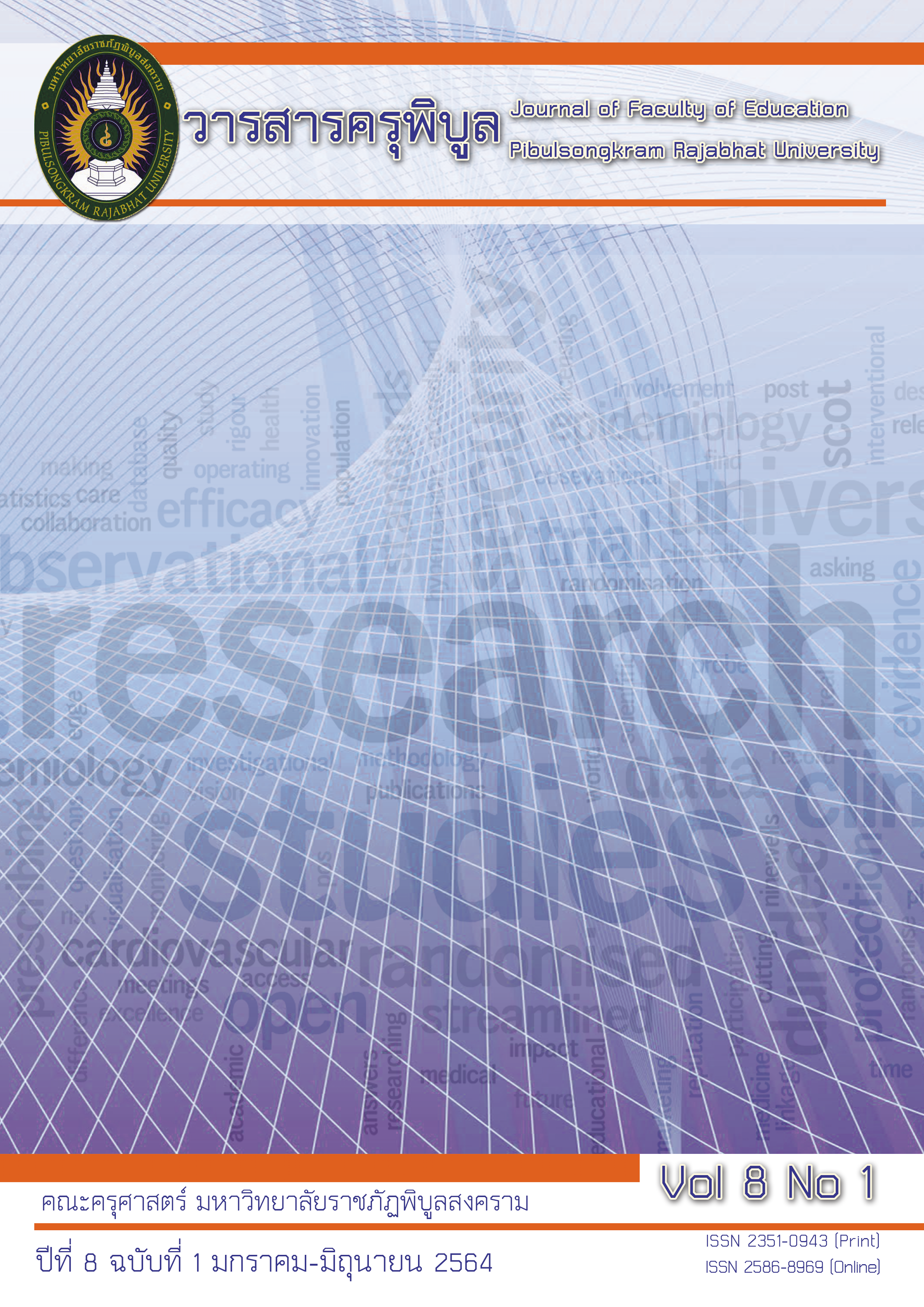THE DEVELOPMENT OF GRADE 12th STUDENTS’ SCIENTIFIC ARGUMENTATION SKILLS THROUGH SOCIOSCIENTIFIC ISSUES LEARNING
Keywords:
Scientific Argumentation, Socioscientific Issues Learning, Human and Environmental SustainabilityAbstract
The purpose of this study was to develop students’ scientific argumentation for students grade 12th by using Socioscitific Issues Learning. Target group were 37 students. Observational protocol was scientific argumentation questionnaires (ASQ), interview logs, and observation logs. The researcher analyzed quantitative data with calculation of the frequencies, standard deviation (S.D.) and percentages. The findings showed that students’ scientific argumentation skills pass level good (6-8 score) in the amount of 15 (40.5 percentage). The components that most students for developed were claims and warrants and the component that fewer students developed were evidence and supportive argument.
References
กฤษฎา ทองประไพ, ศศิเทพ ปิติพรเทพิน, กฤษณา ชิยสิญจน์ และอรยา แจ่มใจ. (2559). การพัฒนาการโต้แย้งของนักเรียนชั้นมัธยมศึกษาปีที่ 2 ในหน่วยการเรียนรู้เรื่อง อาหารกับการดำรงชีวิต โดยการจัดการเรียนรู้โดยใช้ประเด็นทางสังคมที่เกี่ยวเนื่องกับวิทยาศาสตร์เป็นฐาน. วารสารหน่วยวิจัยวิทยาศาสตร์ เทคโนโลยีและสิ่งแวดล้อมเพื่อการเรียนรู้, 7(1), 1-14.
บุรีรัตน์ สือพัฒธิมา. 2558. การพัฒนาทักษะการโต้แย้งของนักเรียนชั้นมัธยมศึกษาปีที่ 6 ในหน่วยการเรียนรู้เรื่องเชื้อเพลิงซากดึกดำบรรพท์และผลิตภัณฑ์ด้วยการจัดการเรียนรู้โดยใช้ประเด็นทางวิทยาศาสตร์และสังคม. วิทยานิพนธ์ ศ.บ. (สาขาวิทยาศาสตร์ศึกษา) มหาวิทยาลัยเกษตรศาสตร์.
ภาวิณี รัตนคอน และนันทรัตน์ เครืออินทร์. (2561ก). การพัฒนาเกณฑ์การประเมินทักษะการโต้แย้งโดยใช้ประเด็นทางสังคมที่เกี่ยวข้องกับวิทยาศาสตร์ สำหรับนักเรียนชั้นมัธยมศึกษาปีที่ 3. วารสารวิชาการ Veridian E –Journal,Silpakorn University ฉบับภาษาไทย สาขามนุษยศาสตร์ สังคมศาสตร์ และศิลปะ, 11(2), 2720–2735.
ภาวิณี รัตนคอน และนันทรัตน์ เครืออินทร์. (2561ข). การศึกษาผลสัมฤทธิ์ทางการเรียนและทักษะการโต้แย้งโดยใช้ประเด็นทางสังคมที่เกี่ยวข้องกับวิทยาศาสตร์ของนักเรียนชั้นมัธยมศึกษาปีที่ 3. วารสารมนุษยศาสตร์และสังคมศาสตร์ มหาวิทยาลัยราชภัฎอุดรธานี, 7(1), 139-158.
Dawson, M. V., & Venville., G. (2008). Teaching strategies for developing students’ argumentation skill about socioscientific issues in high school. Research in Science Education, 40, 133–148.
Driver, R., Newton, P. & Osborne, J. (2000). Establishing the norms of scientific argumentation in classrooms. Science Education, 84(3), 287–312.
Lin, S. S., & Mintzes, J. J. (2010). Learning Argumentation Skills Through Instruction in Socioscientific Issues: The Effect of Ability Level. International Journal of Science and Mathematics Education, 8(6), 993–1017.
Osborne, J., Erduran, S., Simon, S. & Monk, M. (2001). Enhancing the quality of argument in school science. School Science Review, 28(301), 63–70.
Rundgren, C.-J, Eriksson, M. & Rundgren, S.-N. (2016). Investigating the Intertwinement of Knowledge, Value, and Experience of Upper Secondary Students’ Argumentation Concerning Socioscientific Issues. Science and Education, 25, 1049–1071.
Sadler, T. D. & D. L. Z. (2004). The morality of socioscientific issues: Construal and resolution of genetic engineering dilemmas. Science and Education, 88, 4–27.
Sadler, T.D. & Zeidler, D. L. (2005). Patterns of information reasoning in the context of socioscientific decision-making. Journal of Research in Science Teaching, 42(1), 112–138.
Sadler. & L. A. Donnelly. (2006). “Socioscientific argumentation: The effects of content knowledge and morality”. International Science Eduction 28: 1463-1488.
Schwartz, B. B. (2009). Argumentation and Learning. Argumentation and Education: Theoretical Foundations and Practices. School of Education. Israel: Hebrew University of Jerusalem.
Suephatthima, B. (2015). The Development of Argument Skills in Fossil Fuels and Their Products Learning Unit for Grade 12 Thai Students through Socio-Scientific Issues. Master of Education (Science Education), Bangkok: Kasetsart University.
Zohar, A. and Nemet, F. (2002). Fostering students’ knowledge and argumentation skills through dilemmas in human genetics. Jurnal of Research in Science Teaching, 39, 35-62.



